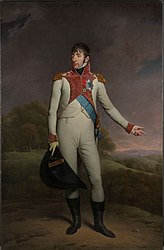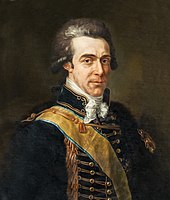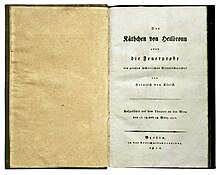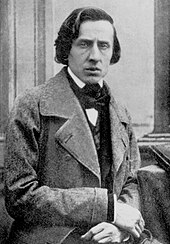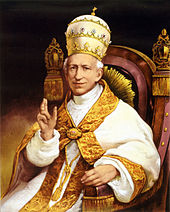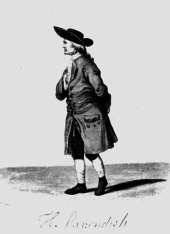1810
Portal history | Portal Biographies | Current events | Annual calendar
◄ |
18th century |
19th century
| 20th century
| ►
◄ |
1780s |
1790s |
1800s |
1810s
| 1820s
| 1830s
| 1840s
| ►
◄◄ |
◄ |
1806 |
1807 |
1808 |
1809 |
1810
| 1811
| 1812
| 1813
| 1814
| ►
|►►
| 1810 | |
|---|---|
|
Andreas Hofer , leader of the Tyrolean freedom fighters , is shot in Mantua on the orders of Napoleon Bonaparte . |
|
|
Louis Bonaparte abdicates as King of Holland because of differences with his brother Napoleon . |
Karl August von Hardenberg becomes Prussian State Chancellor and continues the reform work of his predecessor Heinrich Friedrich Karl vom und zum Stein . |
| 1810 in other calendars | |
| Armenian calendar | 1258/59 (turn of the year July) |
| Ethiopian calendar | 1802/03 (September 10/11) |
| Bengali solar calendar | 1215/16 (beginning of April 14th or 15th) |
| Buddhist calendar | 2353/54 (southern Buddhism); 2352/53 (alternative calculation according to Buddha's Parinirvana ) |
| Chinese calendar | 75th (76th) cycle
Year of the Metal Horse庚午 ( at the beginning of the year Earth-Snake己巳) |
| Chula Sakarat (Siam, Myanmar) / Dai calendar (Vietnam) | 1172/73 (turn of the year April) |
| Dangun era (Korea) | 4143/44 (October 2/3) |
| Iranian calendar | 1188/89 |
| Islamic calendar | 1224/25 (turn of the year 5th / 6th February) |
| Jewish calendar | 5570/71 (September 28-29) |
| Coptic calendar | 1526/27 (September 10-11) |
| Malayalam calendar | 985/986 |
| Seleucid era | Babylon: 2120/21 (turn of the year April)
Syria: 2121/22 (turn of the year October) |
| Vikram Sambat (Nepalese Calendar) | 1866/67 (April) |
Events
Politics and world events
Europe
In 1810 the French Empire was at the height of its power. Large parts of Europe were ruled by the Napoleon Bonaparte family. In Spain, Napoleon's eldest brother Joseph sat on the throne. The youngest brother Jerome ruled the Kingdom of Westphalia . The officer Joachim Murat , who was married to the youngest sister Caroline Bonaparte , was King of Naples. Napoleon's adopted son Eugène de Beauharnais acted as Viceroy of Italy. The eldest sister Elisa was the Grand Duchess of Tuscany. The son of Louis Bonaparte , Napoléon Louis ruled the Grand Duchy of Berg . Only two of Napoleon's siblings had no titles or honors at the end of 1810: Lucien was captured by the British on a trip to the USA. Louis, who fell out with Napoleon in his role as King of Holland because of the continental blockade , lived in exile in Rome. Because of his marriage plans , Napoleon was encouraged in 1810 to reform the territorial order in his sphere of influence as much as he wanted to leave it to his heir to the throne: on January 12, 1810, large parts of the northern former Electorate of Hanover fell to the Kingdom of Westphalia. France annexed Rome on February 17, 1810. On February 28, 1810, the Kingdom of Bavaria was awarded part of Franconia in exchange for Trentino , which fell to the Kingdom of Italy. On July 9, 1810, Holland and the North German Hanseatic cities were incorporated into the Empire.
From 1810 Napoleon increasingly distanced himself from his previous practice of distributing states to family members. Instead of asserting the interests of France, his brothers and sisters had developed sympathy for the peoples entrusted to them. Napoleon therefore saw the unity of his sphere of influence endangered. Louis Bonaparte felt this hardest: he had tried to start peace negotiations with England through the banker Gabriel-Julien Ouvrard . In this way the trade, which had been brought to a standstill by the Napoleonic continental barrier, was to be revived. In response, Napoleon occupied the area to the left of the Waal in March 1810 . Louis abdicated, whereupon Napoleon annexed the entire Kingdom of Holland. On December 13, 1810, Napoleon reduced the size of the Kingdom of Westphalia again. He formed the part of the kingdom north of the Minden-Ratzeburg line into three French departments . Napoleon also severely restricted the political freedom of action of the Spanish King Joseph. On February 8, 1810, he issued a decree in which he encouraged the formation of military governments in the provinces of Spain.
- January 6th : The Treaty of Paris ends the state of war between France and Sweden . Sweden gets under the terms of the agreement Swedish Pomerania and the island of Rügen , on the other hand, participates in return to the against UK -looking continental blockade .
- January 10th : The marriage between Napoleon I and Joséphine is annulled in court.
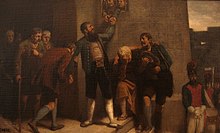
- January 28th : The Tyrolean freedom fighter Andreas Hofer is arrested by the French at the Pfandleralm near St. Martin in Passeier . Franz Raffl betrayed his hiding place . Hofer was shot dead in Mantua on February 20th .
- February 6th : The French begin the siege of Cadiz during the Napoleonic Wars . The city was not captured and in 1812 the troops withdrew.
- February 28 : In the Treaty of Paris, Bavaria cedes southern Tyrol to Italy, which belongs to France.
- March 16 : In a Paris meeting between Napoleon and his brother Louis (King of Holland at the time ), Holland ceded the area of the mouths of the Rhine and Meuse to France.

- March 11 : Deputy wedding of Marie-Louise with Napoleon Bonaparte in Vienna
- April 1st : Civil marriage of Napoleon and Marie-Louise in the castle of Saint-Cloud
- April 2nd : Church wedding of Napoleon and Marie-Louise in the Louvre Chapel
- June 4 : In Prussia is Karl August Baron von Hardenberg appointed to head the government. He continues the Prussian reforms .
- June 20 : The Swedish statesman Hans Axel von Fersen is trampled to death by residents in Stockholm. The population sees in him a perpetrator for the rumored poisoned and popular heir to the throne, whose funeral procession is led by Fersen in splendid robes. The soldiers present do nothing to protect their riksmarskale from popular anger.
- June 30th : France hands over the occupied Principality of Bayreuth to the Kingdom of Bavaria at a price of 15 million francs .
- July 1st : Louis Bonaparte decides to abdicate as King of Holland . He is reacting to irreconcilable differences with his brother Napoleon Bonaparte, the French emperor, about the continued existence of the kingdom.
- July 9 : Napoleon declares the Kingdom of Holland dissolved and annexes the Netherlands as French territory.
- July 9th : The first siege of Ciudad Rodrigo ends in the Napoleonic Wars on the Iberian Peninsula with the capture of the Spanish city by the besieging French under Marshal Michel Ney .
- August 16 : Highest organizational patent for the constitution of the Grand Duchy of Frankfurt
- August 21 : The Swedish Diet elects French Marshal Jean-Baptiste Bernadotte as Crown Prince .
- September 27 : In the Battle of Busaco , Napoleonic invasion troops in Portugal lose to a British-Portuguese army under the command of the Duke of Wellington
- October 2 : Border treaty between Württemberg and Baden between Württemberg and Baden
- October 12 : Therese von Sachsen-Hildburghausen and the Bavarian Crown Prince Ludwig marry in Munich . The wedding celebration on the Theresienwiese ends with a horse race , from whose subsequent annual events the Oktoberfest blossoms.
- November 17 : Sweden explained to pressure Napoleon Bonaparte Britain to war .
- December 10th : Napoleon Bonaparte annexes the duchies of Arenberg and Oldenburg by decree (completed in February 1811)
- December 13 : By a decree by Napoleon Bonaparte, the northern German coastal areas are annexed in order to increase the effectiveness of the continental barrier. Among other things, the Duchy of Oldenburg and the Hanseatic cities of Bremen , Hamburg and Lübeck become part of the French Empire . Napoleon Bonaparte annexed the Principality of Salm by decree .
- The Volga-Baltic Sea Canal is completed
- By changing the territorial Ulm from Bavaria to Württemberg with demarcation in the middle of the Danube, the settlements remain the right of the Danube in Bavaria and form the new church "Ulm on the right bank of the Danube", later Neu-Ulm
- Under Napoleon, the “ code pénal ” regulated the use of the neck iron (le carcan), branding and mutilation, among other things.
United States of America
- March 16 : In the decision of Fletcher v. Peck is the first time the US Supreme Court has declared a state law unconstitutional .
- April: Daniel D. Tompkins wins the New York gubernatorial election .
Latin America
- May 25th : The May Revolution takes place in the viceroyalty of the Río de la Plata : In Buenos Aires , the bourgeoisie forces the viceroy to tolerate a congress next to them, thus laying the foundation for the independence of Argentina from Spain .
- July 20 : The Colombian independence movement proclaims the First Republic of Colombia in Bogotá .
- September 16 : The Mexican War of Independence begins with an uprising in Dolores led by Miguel Hidalgo (final independence after war 1821 ).
- September 18 : In Santiago de Chile , the town hall creates an administrative junta. Beginning of the Chilean independence process .
Caribbean
- February 4th : The British navy takes French- ruled Guadeloupe .
Africa
- July 6th to 8th : Mauritius campaign : British units conquer the island of Réunion .
- 23 / August 24 : The Battle of Grand Port in the Indian Ocean ends with a French victory, but that the conquest of Mauritius by the British ultimately can not prevent.
- December 3rd : The British conquer the islands of Mauritius and Rodrigues from the French
- The emirate of Liptako , an empire of the Fulbe in the north of today's Burkina Faso , is founded.
economy
- March 2 : In London, the first starts gas works with the power supply . By means of a coke oven is coal gasified .
- March 29 : Friedrich Koenig receives a patent for his platen printing machine . A few months later, he developed the model into a high-speed press .
- August 5th : In addition to the continental blockade , Napoleon Bonaparte in France imposes 50 percent tariffs on imported goods regardless of their origin in the Trianon decree .
- August 25 : Briton Peter Durand receives a patent on the tin .
- November 2nd : The trade tax edict aims to stimulate the market economy in Prussia .
science and technology
- May 16 : The Cotta'schen Verlagsbuchhandlung in Tübingen publishes the two volumes of books on the theory of colors by Johann Wolfgang von Goethe .
- May 24th : In order to avoid the sound tariff on the Oresund , the construction of the Göta Canal begins in Sweden to create a ship connection between Kattegat and the Baltic Sea . The Göta Canal Company under the direction of Baltzar von Platen received permission to build the canal on April 11th .
- October 15 : Under Gerhard von Scharnhorst , teaching begins in Prussia at the new academy for young officers , from which changes of name first become the General War School and then the Prussian War Academy . It is designed as a military college for staff officers.
- The Humboldt University of Berlin is founded as the Friedrich Wilhelm University .
- With his main work Organon of medicine founded Samuel Hahnemann , the homeopathy .
Culture and society
Architecture and fine arts
- February 9 : By decree, Napoléon Bonaparte orders the construction of a monumental fountain in the shape of a bronze elephant on the square of the Bastille, which was demolished during the French Revolution .
- The pair of paintings The Monk by the Sea and Abbey in the Oak Forest by Caspar David Friedrich will be shown for the first time at the Berlin Academy Exhibition and will be presented by the Prussian King Friedrich Wilhelm III. acquired.
- The architect Nicolas Alexandre Salins de Montfort built the Nebbiensche garden house , a classical pavilion in the ramparts in Frankfurt am Main , for the publisher Marcus Johannes Nebbien .
literature
- Walter Scott publishes The Lady of the Lake . The narrative poem immediately became a best seller and contributed to the romantic transfiguration of Scotland.
Music and theater
- March 17 : The drama Cathy of Heilbronn by Heinrich von Kleist has its world premiere at the Theater an der Wien and soon reached a high level of awareness.
- March 26th : The premiere of the opera Mathilde von Guise by Johann Nepomuk Hummel takes place at the Theater am Kärntnertor in Vienna.
- May 24th : The incidental music to Goethe's tragedy Egmont by Ludwig van Beethoven is premiered at the Vienna Burgtheater .
- September 1st : The opera Le Crescendo by Luigi Cherubini is premiered at the Opéra-Comique in Paris.
- September 20 : The London newspaper The Morning Post announces the public appearance of "Hottentot Venus" Sarah Baartman .
- November 3 : The opera La cambiale di matrimonio by Gioacchino Rossini is premiered at the Teatro San Moisè in Venice.
religion
- September 16 : By Jerome Bonaparte , the monastery Wormeln in the Kingdom of Westphalia canceled.
Disasters
- September 1 : The gunpowder explosion in Eisenach killed 68 people and injured several hundred.
Born
January February
- January 1 : Karl Mager , German school teacher and school politician († 1858 )
- January 3 : Antoine Thomson d'Abbadie , French explorer († 1897 )
- January 10 : Jeremiah S. Black , American lawyer, politician and foreign minister († 1883 )
- January 11 : Johann Ludwig Krapf , German missionary († 1881 )
- January 12 : Ferdinand II , King of Naples and the Sicilies of both († 1859 )
- January 13 : Thomas Jean Arbousset , French missionary († 1877 )
- January 16 : Karl Grunert , German actor († 1869 )
- January 20 : Ferdinand David , German composer († 1873 )
- January 21 : Pierre de Failly , French general († 1892 )
- January 29 : Ernst Eduard Kummer , German mathematician († 1893 )
- January 30th : Karl Bernhard Hundeshagen , Reformed theologian († 1872 )
- February 2 : Heinrich Kümmel , German sculptor († 1855 )
- February 3 : Adolf Spieß , German sports educator († 1858 )
- February 5 : Ole Bull , Norwegian violinist and composer († 1880 )
- February 8 : Norbert Burgmüller , German composer († 1836 )
- February 10 : Miklós Barabás , Hungarian painter († 1898 )
- February 14 : Carmine Gori-Merosi , Italian cardinal († 1886 )
- February 15 : Mary SB Dana , American writer († 1883 )
- February 20 : Henri Martin , French historian and politician († 1883 )
- February 22nd : Holger Simon Paulli , Danish conductor and composer († 1891 )
- February 22 or March 1 : Frédéric Chopin , Polish composer and pianist († 1849 )
March April
- March 2 : Leo XIII. , Pope from 1878 to 1903 († 1903 )
- March 6 : George Robert Waterhouse , English zoologist and naturalist († 1888 )
- March 9 : Jean-Georges Kastner , French composer († 1867 )
- March 9 : Johann Heinrich Gottlieb Luden , German legal scholar († 1880 )
- March 10 : Louis Gallait , Belgian painter († 1887 )
- March 11 : Eberhard zu Stolberg-Wernigerode , politician and Prussian civil servant († 1872 )
- March 14 : Giovanni Antonio Vanoni , painter († 1886 )
- March 15 : Jakob Becker , German painter, etcher and lithographer († 1872 )
- March 21 : Johann Anzengruber , Austrian writer († 1844 )
- March 27 : Adolf Glaßbrenner , German humorist and satirist († 1876 )
- March 28 : Nathan K. Hall , American politician († 1874 )
- April 2 : Friedrich Wilhelm Schoen , German painter and lithographer († 1868 )
- April 4 : James Freeman Clarke , American preacher and author († 1888 )
- April 11 : Johann Rudolf Kutschker , Austrian Archbishop and Cardinal († 1881 )
- April 11 : Henry Creswicke Rawlinson , British Assyriologist and diplomat († 1895 )
- April 12 : Heinrich von Rustige , German painter († 1900 )
- April 17 : Johann Ulrich Wirth , German Protestant theologian and philosopher († 1879 )
- April 18 : Neill S. Brown , American politician, governor of Tennessee († 1886 )
- April 29 : Franz Raveaux , German revolutionary of the March Revolution († 1851 )
May June
- May 2 : Hans Christian Lumbye , Danish composer († 1874 )
- May 3 : Carl Wilhelm Otto Koch , German politician († 1876 )
- May 4 : Alexandre Colonna-Walewski , son of Napoleon I and his lover Maria Walewska († 1868 )
- May 6 : Friedrich August Eckstein , German classical philologist and lexicographer († 1885 )
- May 8 : Mathias Auinger , Austrian paleontologist († 1890 )
- May 8 : James Cooper , American politician († 1863 )
- May 9 : Marianne von Oranien-Nassau , Prussian princess († 1883 )
- May 10 : Thomas Watkins Ligon , American politician († 1881 )
- May 15 : Jacob Thompson , American politician († 1885 )
- May 18 : Johann Peter Hasenclever , German genre painter († 1853 )
- May 23 : Margaret Fuller , American writer († 1850 )
- May 24 : Abraham Geiger , member of the Jewish reform movement († 1874 )
- May 25 : Pierre Edmond Boissier , Swiss botanist († 1885 )
- May 28 : Alexandre Calame , Swiss painter († 1864 )
- May 28 : Peter Reichensperger , German politician († 1892 )
- May 31 : Horatio Seymour , American politician († 1886 )
- June 6 : Giuseppe Pioda , Swiss architect and engineer († 1856 )
- June 6 : Friedrich Wilhelm Schneidewin , German classical philologist († 1856 )
- June 8 : Robert Schumann , German Romantic composer († 1856 )
- June 9 : Otto Nicolai , German composer († 1849 )
- June 15 : Friedrich August Wilhelm Wenck , German historian († 1810)
- June 17 : Ferdinand Freiligrath , German lyric poet, poet and translator († 1876 )
- June 23 : Fanny Elßler , Austrian ballerina († 1884 )
- June 26 : Rageth Christoffel , Swiss pastor and teacher († 1875 )
- June 28th : Thekla von Gumpert , German children's and youth writer († 1897 )
July August
- July 2 : Eduard Jakob von Steinle , Austrian painter († 1886 )
- July 5 : PT Barnum , American circus pioneer († 1891 )
- July 6 : Wilhelm von Urach , Duke of Urach, Count of Württemberg († 1869 )
- July 8 : José María Achá Valiente , Bolivian general and politician († 1868 )
- July 8 : Gabriel Gustav Valentin , German doctor and physiologist († 1883 )
- July 8 : Johanna Kinkel , German composer and writer († 1858 )
- July 10 : Agénor Étienne de Gasparin , French publicist and politician († 1871 )
- July 15 : Johann Jacob Löwenthal , Hungarian-British chess master († 1876 )
- July 16 : Franz Xaver Schönwerth , German folklorist († 1886 )
- July 20 : Georg Jakob Friedrich Karl Aulenbach , German poet († 1882 )
- July 21 : Henri Victor Regnault , French physicist and chemist († 1878 )
- July 24 : Bernhard von Bismarck , Prussian Chamberlain, District Administrator and Privy Councilor († 1893 )
- July 25 : Georg Eduard Steitz , German Protestant theologian and historian († 1879 )
- July 30th : Leonhard von Blumenthal , Prussian Field Marshal General († 1900 )
- August 2 : Amos Tuck , American politician († 1879 )
- August 4th : Johann Luzius Isler , Bündner confectioner and amusement park operator in St. Petersburg († 1877 )
- August 7th : Karl Johann Formes , German opera singer (bass) († 1889 )
- August 11 : Alfred von Henikstein , Austrian Lieutenant Field Marshal († 1882 )
- August 13 : Christian Christoph Andreas Lange , Norwegian archivist († 1861 )
- August 28 : Carl August Haupt , German composer († 1891 )
- August 28 : Constant Troyon , French painter († 1865 )
- August 29 : Juan Bautista Alberdi , Argentine politician, diplomat, writer and journalist († 1884 )
- August 30 : Onslow Stearns , American politician († 1878 )
September October
- September 2 : Friedrich von Hegnenberg-Dux , Bavarian landowner and politician († 1872 )
- September 3 : Paul Kane , Canadian painter († 1871 )
- September 6th : Ludwig Rotter , Austrian organist and composer († 1895 )
- September 7 : Claude Joseph Gaillardin , French history teacher and researcher († 1880 )
- September 7th : Hermann Heinrich Gossen , Prussian economist († 1858 )
- September 10 : Albert Gallatin Blanchard , Brigadier General in the Confederate Army in the Civil War († 1891 )
- September 12 : Philip F. Thomas , American politician († 1890 )
- September 18 : Francisco Serrano Domínguez , Spanish general and politician († 1885 )
- September 28 : Giuseppe Berardi , Italian cardinal († 1878 )
- September 29 : Elizabeth Gaskell , British writer († 1865 )
- September 29 : Hugh Allan , Canadian entrepreneur († 1882 )
- October 3 : Johann Bartholome Arpagaus , Swiss politician and doctor († 1882 )
- October 8 : James W. Marshall , trigger of the gold rush († 1885 )
- October 10 : Carl Heinrich Wilhelm Hagen , German historian († 1868 )
- October 11 : Anton Zwengauer , German painter († 1884 )
- October 15 : Henricus Christianus Millies , Dutch Lutheran theologian and orientalist († 1868 )
- October 16 : Joseph Hoffmann , German builder and mayor of Ludwigshafen († 1881 )
- October 19 : Cassius Marcellus Clay , American abolitionist and politician († 1903 )
- October 24 : Thomas G. Turner , American politician († 1875 )
- October 26 : Carl Ludwig Adolf Gamradt , Prussian District Administrator, member of the Frankfurt National Assembly and the Prussian House of Representatives († 1860 )
November December
- November 1 : Friedrich Ahlfeld , German theologian, preacher and author († 1884 )
- November 5 : Leopold Stein , German rabbi († 1882 )
- November 7th : Ferenc Erkel , Hungarian composer († 1893 )
- November 7th : Fritz Reuter , German writer († 1874 )
- November 8 : Pierre Bosquet , French general, Marshal of France († 1861 )
- November 9 : Bernhard von Langenbeck , German surgeon († 1887 )
- November 10 : Lazarus Levi Adler , writer and regional rabbi of Hesse-Nassau († 1886 )
- November 10 : Eduard von Simson , German lawyer and politician († 1899 )
- November 14 : Hector Lefuel , French architect († 1880 )
- November 16 : Karel Hynek Mácha , Czech romantic poet († 1836 )
- November 16 : Gustav Rée , Baden politician († 1869 )
- November 17 : Alexander Cummings , American politician († 1879 )
- November 18 : Asa Gray , North American botanist († 1888 )
- November 19 : August Willich , Baden revolutionary, general in the American Civil War († 1878 )
- November 20 : Christian Johann Heinrich Schmidt , German engine driver († 1885 )
- November 21 : Allen T. Caperton , American politician († 1876 )
- November 24th : Adolph Baedeker , German publisher and bookseller († 1906 )
- November 25 : Charles E. Stuart , American politician († 1887 )
- November 26 : William George Armstrong , British industrialist († 1900 )
- November 28 : William Froude , English naval engineer and researcher († 1879 )
- November 30 : Henry B. Payne , American politician († 1896 )
- December 7th : Josef Hyrtl , Austrian anatomist († 1894 )
- December 7th : Theodor Schwann , German physiologist († 1882 )
- December 8 : Conrad Kreuzer , Austrian draftsman and landscape painter († 1861 )
- December 10 : Gozewijn Jan Loncq , Dutch doctor († 1887 )
- December 11 : Alfred de Musset , French writer († 1857 )
- December 14 : John Burton Thompson , American politician († 1874 )
- December 15 : Peter Andreas Munch , Norwegian historian († 1863 )
- December 21 : Johann Christian Konrad von Hofmann , German Protestant theologian († 1877 )
- December 21 : Anthony Kennedy , American politician († 1892 )
- December 23 : Edward Blyth , English zoologist and ornithologist († 1873 )
- December 23 : Jakob Friedrich Reiff , German philosopher († 1879 )
- December 23 : Karl Richard Lepsius , German Egyptologist and Africa explorer († 1884 )
- December 24th : Vilhelm Marstrand , Danish painter († 1873 )
- December 27 : Ludwig Dessoir , German actor († 1874 )
- December 29 : Christoph Hävernick , German theologian of the revival movement († 1845 )
Exact date of birth unknown
- Francisco de Aguilar , Honduran politician
- Johann Ludwig Aickelin , German scribe and copyist († 1884 )
- Juan Bautista Alfonseca , Dominican composer and conductor († 1875 )
- George Alfred Arney , New Zealand judge († 1883 )
- José Miguel Arroyo , Mexican Ambassador and Foreign Minister († 1867 )
- John Baptista Ashe , American politician († 1857 )
- Julian Fontana , Polish pianist and composer († 1869 )
- John Hiles , English organist and music teacher († 1882 )
Died
First half of the year
- 4th January : Josef Achammer , Tyrolean freedom fighter and rifle captain von Sillian (* 1762 )
- January 4th : Clemens August von Merle , auxiliary bishop in Cologne (* 1732 )
- January 7th : Josef Lipavský , Czech composer (* 1772 )
- January 7th : Johann Otto Thieß , German Lutheran theologian (* 1762 )
- January 16 : Ekaterina Romanovna Voronzowa-Daschkowa , important figure of the Enlightenment in Russia (* 1743 )
- January 23 : Johann Wilhelm Ritter , German physicist and philosopher (* 1776 )
- February 4 : Fyodor Gordejewitsch Gordejew , Russian sculptor and university professor (* 1744 )
- February 9 : Richard Chandler , British archaeologist (* 1738 )
- February 10 : Karl Friedrich am Ende , Austrian Lieutenant Field Marshal (* 1756 )
- February 20 : Andreas Hofer , Tyrolean freedom fighter (* 1767 )
- February 20 : Peter Mayr , Tyrolean freedom fighter (* 1767 )
- February 24 : Henry Cavendish , British natural scientist (* 1731 )
- March 7th : Cuthbert Collingwood , British Vice Admiral (* 1750 )
- March 9 : Ozias Humphry , English painter (* 1742 )
- March 10 : Auguste Dorothea von Braunschweig-Wolfenbüttel , German abbess (* 1749 )
- March 24th : Mary Tighe , Irish writer, (* 1772 )
- March 31 : Luigi Lanzi , Italian historian (* 1732 )
- April 8 : Joseph Anton Felix von Balthasar , Swiss politician (* 1737 )
- April 9th : Alessandro Malaspina di Mulazzo , Italian nobleman and seafarer in Spanish service (* 1754 )
- May 9 : Benjamin Lincoln , American general in the War of Independence (* 1733 )
- May 21 : Charles Geneviève Louis Thimothée d'Eon de Beaumont , French diplomat, soldier, writer (* 1728 )
- May 24 : Christoph Gottlob Heinrich , German historian (* 1748 )
- May 31 : Heinrich Sautier , German Jesuit and founder (* 1746 )
- June 1 : Johann Paul Wessely , Czech composer (* 1762 )
- June 4 : William Windham , British politician (* 1750 )
- June 13 : Johann Gottfried Seume , German writer and poet (* 1763 )
- June 19 : Richard Luke Concanen , first Roman Catholic bishop of New York (* 1747 )
- June 21 : Giovanni Battista Cardinal Caprara , Archbishop of Milan (* 1733 )
- June 26 : Louis Auguste Philippe Frédéric François, 2ème Comte d'Affry , Swiss Landammann (* 1743 )
Second half of the year
- July 19 : Luise von Mecklenburg-Strelitz , Prussian Queen (* 1776 )
- July 27 : Eugen Johann Christoph Esper , German entomologist, botanist and pathologist (* 1742 )
- July 27 : Philipp von Hertling , German lawyer (* 1756 )
- July 30th : Johann Andreas Sixt , German Protestant theologian and philologist (* 1742 )
- August 26 : Santiago de Liniers , French officer in the Spanish service, viceroy of the Río de la Plata (* 1753 )
- August 30 : Philipp von Cobenzl , Austrian statesman (* 1741 )
- August 31 : Melchior Ludolf Herold , German hymn composer and priest (* 1753 )
- August: Bernhard Vinzenz Adler , Bohemian medic (* 1753 )
- September 14th : Wilhelm Florentin von Salm-Salm , Archbishop of Prague (* 1745 )
- September 16 : Franz von Fürstenberg , German statesman and theologian (* 1729 )
- September 19 : Gabriel de Avilés , Spanish officer, colonial administrator, viceroy of the Río de la Plata and viceroy of Peru (* 1735 )
- September 28 : John Archer , American politician (* 1741 )
- October 7th : Giuseppe Fossati , Ticino lawyer and translator (* 1759 )
- October 16 : Christoph Daniel Prätorius , German lawyer and educator (* 1733 )
- October 19 : Jean Georges Noverre , French dancer and choreographer (* 1727 )
- November 1 : Henricus Aeneae , Dutch scientist (* 1743 )
- November 2 : Amalia Sophia Eleanor , member of the British Royal Family (* 1783 )
- November 11th : John Laurance , American politician (* 1750 )
- November 11th : Johann Zoffany , British painter of German origin (* 1733 )
- November 26 : Nicolas-Étienne Framery , French writer and composer (* 1745 )
- December 1 : Jean-Baptiste Treilhard , French politician and member of the board of directors (* 1742 )
- December 2 : Philipp Otto Runge , German painter (* 1777 )
- December 10th : Johann Christian von Schreber , German physician and natural scientist (* 1739 )
- December 14 : Cyrus Griffin , American politician (* 1749 )
- December 18 : Johann Gabriel Arnauld de la Perière , Prussian major general (* 1731 )
- December 19 : Roman Anton Boos , German sculptor (* 1733 )
Exact date of death unknown
- Andrianampoinimerina , King of Madagascar (* around 1745 )
- Johann Georg Fellwöck , German mechanic (* 1728 )
Web links
Individual evidence
- ^ Thierry Lentz : The geographical climax of the French Empire In: 1810. The politics of love: Napoleon I and Marie-Louise in Compiegne, exhibition catalog of the National Museum in Compiegne Castle. Réunion des Musées nationaux. Paris 2010. p. 24
- ↑ Jean Tulard : Napoleon or the Myth of the Savior. A biography. Whimsical. Tübingen 1978. p. 348.

